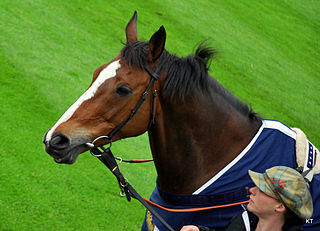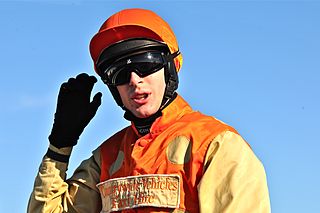Related Research Articles

Arkle was an Irish Thoroughbred racehorse. A bay gelding by Archive out of Bright Cherry, he was the grandson of the unbeaten flat racehorse and prepotent sire Nearco. Arkle was bred by Mary Baker of Malahow House, near Naul, County Dublin, Ireland, and was born at Ballymacoll Stud, County Meath. He was owned by Anne Grosvenor, Duchess of Westminster, who named him after the mountain Arkle in Sutherland, Scotland, that bordered her Sutherland estate. Trained by Tom Dreaper at Greenogue, Kilsallaghan, in County Dublin, he was ridden during his steeplechasing career by Pat Taaffe.
In horse racing in the United Kingdom, France and Republic of Ireland, National Hunt racing requires horses to jump fences and ditches. National Hunt racing in the UK is informally known as "jumps" and is divided into two major distinct branches: hurdles and steeplechases. Alongside these there are "bumpers", which are National Hunt flat races. In a hurdles race, the horses jump over obstacles called hurdles; in a steeplechase the horses jump over a variety of obstacles that can include plain fences, water jump or an open ditch. In the UK, the biggest National Hunt events of the year are generally considered to be the Grand National and the Cheltenham Gold Cup.

The Cheltenham Gold Cup is a Grade 1 National Hunt horse race run on the New Course at Cheltenham Racecourse in England, over a distance of about 3 miles 2½ furlongs, and during its running there are 22 fences to be jumped. The race takes place each year during the Cheltenham Festival in March.

Best Mate was an Irish-bred, English-trained racehorse and three-time winner of the Cheltenham Gold Cup. He was a popular horse, and his sudden death while racing made front-page news.
The Irish Grand National is a National Hunt steeplechase in Ireland which is open to horses aged five years or older. It is run at Fairyhouse over a distance of about 3 miles and 5 furlongs, and during its running there are twenty-four fences to be jumped. It is a handicap race, and it is scheduled to take place each year on Easter Monday.
Michael Vincent O'Brien was an Irish race horse trainer from Churchtown, County Cork, Ireland. In 2003 he was voted the greatest influence in horse racing history in a worldwide poll hosted by the Racing Post. In earlier Racing Post polls he was voted the best ever trainer of national hunt and of flat racehorses. He trained six horses to win the Epsom Derby, won three Grand Nationals in succession and trained the only British Triple Crown winner, Nijinsky, since the Second World War. He was twice British champion trainer in flat racing and also twice in national hunt racing; the only trainer in history to have been champion under both rules. Aidan O'Brien took over the Ballydoyle stables after his retirement.

The Queen Mother Champion Chase is a Grade 1 National Hunt steeplechase in Great Britain which is open to horses aged five years or older. As part of a sponsorship agreement with the online betting company Betway, the race is now known as the Betway Queen Mother Champion Chase. It is run on the Old Course at Cheltenham over a distance of about 2 miles, and during its running there are thirteen fences to be jumped. The race is scheduled to take place each year during the Cheltenham Festival in March.
Foinavon (1958–1971) was an Irish racehorse. He won the Grand National in 1967 at odds of 100/1 after the rest of the field fell, refused or were hampered or brought down in a mêlée at the 23rd fence. The fence was officially named after Foinavon in 1984.

Moscow Flyer was an Irish-bred and -trained National Hunt horse who ran over distances between 2 miles and 2+1⁄2 miles (3.2–4 km). A top-class horse who achieved a Timeform rating of 184, he won the Queen Mother Champion Chase in 2003 and 2005, the Tingle Creek Chase in 2003 and 2004 and the Arkle Challenge Trophy in 2002.

Kauto Star was a French-bred National Hunt champion thoroughbred racehorse trained by Paul Nicholls in Somerset and owned by Clive Smith. He was known for his versatility and longevity, being the only horse ever to be top rated over 2 miles, 2.5 miles and 3 miles in the same season. He is also the first horse ever to win a Grade 1 race in six consecutive seasons, which he extended to seven. His Racing Post rating of 192 is the highest ever awarded to a National Hunt horse since those ratings began in 1987. He won the Cheltenham Gold Cup twice, in 2007 and 2009, becoming the first horse to regain the cup. In 2009, he beat Denman by thirteen lengths, after losing to the same horse by seven lengths the previous year. Kauto Star tried for three more years to win the race again, but the best placing he could achieve was third in 2011. He also won the King George VI Chase a record five times. Kauto Star was one of the most successful steeplechasers of any era: he finished his career with a National Hunt record of £3,775,883 in earnings, £2,375,883 of which was winner's prize money, a £1,000,000 bonus for the completion of the 2006/2007 Stayers Chase Triple Crown and a £400,000 reward for heading the BHA Table of Merit in the 2006/2007 season.

Flyingbolt was a famous racehorse. Officially he is the second best steeplechaser of all time, behind only Arkle, who was ironically stabled just a few doors away in the same yard at Kilsallaghan, Co. Dublin where both were trained by Tom Dreaper. A comparison of their merits is probably best illustrated by the Official Handicapper, who at the end of the 1965-1966 season rated Arkle the superior by only 1 lb (0.5 kg). Timeform, the highly respected racing publication, had a difference of 2 lbs between them. However, whereas Arkle is feted and remembered as the greatest steeplechaser of all time, Flyingbolt has been all but forgotten. As a hurdler, he was the best Tom Dreaper ever trained. His wins included the Gloucestershire Hurdle at Cheltenham and the Scalp Hurdle at Leopardstown. He also finished third in the Champion Hurdle at Cheltenham. Flyingbolt and Arkle never met on the race track, mainly because they were trained by the same man, and he preferred to keep them apart.

Paul Frank Nicholls is a British National Hunt horse trainer with stables at Ditcheat, Somerset. A relatively successful jump jockey, Nicholls has become the leading National Hunt trainer of his generation, finishing the 2007–08 season with 155 winners and a record £4 million in prize money. As of April 2023, he has trained over 3,500 winners, won the 2012 Grand National, four Cheltenham Gold Cups and has been crowned British jump racing Champion Trainer fourteen times.

Aidan Coleman is an Irish National Hunt jockey, who has ridden multiple Grade 1 winners in the United Kingdom including at the Cheltenham Festival.
Tommy Carberry was an Irish jockey who rode mostly in National Hunt races. He was Irish jump racing Champion Jockey four times. He is best known for winning the 1975 Grand National on L'Escargot. He rode a total of 16 Cheltenham Festival winners, including L'Escargot in the 1970 and 1971 Gold Cup and Ten Up in the 1975 Gold Cup. After retiring from race riding in 1982 he became a trainer and in 1999 saddled the winner of the Grand National, Bobbyjo.
Patrick Taaffe was an Irish National Hunt jockey who is best remembered as the jockey of Arkle. The pair dominated National Hunt racing in the mid-sixties, winning the Irish Grand National, the King George VI Chase, two Hennessy Gold Cups, three Cheltenham Gold Cups and the Whitbread Cup.
Fortria was an Irish National Hunt horse best known as the first dual winner of the Champion Chase and winner of the inaugural Mackeson Gold Cup. Although very successful over two miles, he also excelled at longer distances, and won the 1961 Irish Grand National and finished second in the 1962 and 1963 Cheltenham Gold Cups.
Stanley Thomas Edward Mellor was a National Hunt jockey and trainer who was the first jockey to ride 1,000 winners and Champion Jockey three years in a row from 1960 to 1962.
Remittance Man was an Irish-bred, British-trained Thoroughbred racehorse who competed under National Hunt rules. He was noted for his consistency, excellent jumping and nervous temperament. Between December 1988 and April 1990 he competed in hurdle races, and showed promise by winning two of his twelve races including the Grade 2 Bristol Novices' Hurdle and never finishing worse than third. When switched to compete in steeplechases he showed immediate improvement and won thirteen of his first fourteen races over fences. In his first season of steeplechasing his wins included the Noel Novices' Chase, Wayward Lad Novices' Chase, Galloway Braes Novices' Chase and Arkle Challenge Trophy. He had his greatest success in the 1991/1992 season when he won the Arlington Premier Chase, Queen Mother Champion Chase and Melling Chase. In the following autumn he won the Desert Orchid Chase and the Peterborough Chase but then sustained a serious tendon injury. He won his comeback race in February 1994 but was beaten in his three remaining races.

Easter Hero (1920–1948) was an Irish-bred British-trained racehorse who won the Cheltenham Gold Cup in 1929 and 1930 and made three unsuccessful attempts to win the Grand National. He showed little early promise and was passed from owner to owner before beginning to display ability in 1927. Wins in the Becher Chase and the Coventry Chase established him as a leading steeplechaser and he was bought by Alfred Loewenstein with the aim of winning the National. In his first attempt at the race he fell at the eighth and brought the field to a virtual halt after becoming trapped in the ditch in front of the fence.
Prince Regent was an Irish Thoroughbred racehorse who won the 1946 Cheltenham Gold Cup. He was the dominant steeplechaser in Ireland during World War II with his wins including the Irish Grand National in 1942. After the war he was able to compete in the major British chases and won the Cheltenham Gold Cup in 1946. He finished third when favourite for the 1946 Grand National and fourth in the race in 1947, carrying top weight on both occasions. He continued to race until the age of fourteen, retiring in 1949.